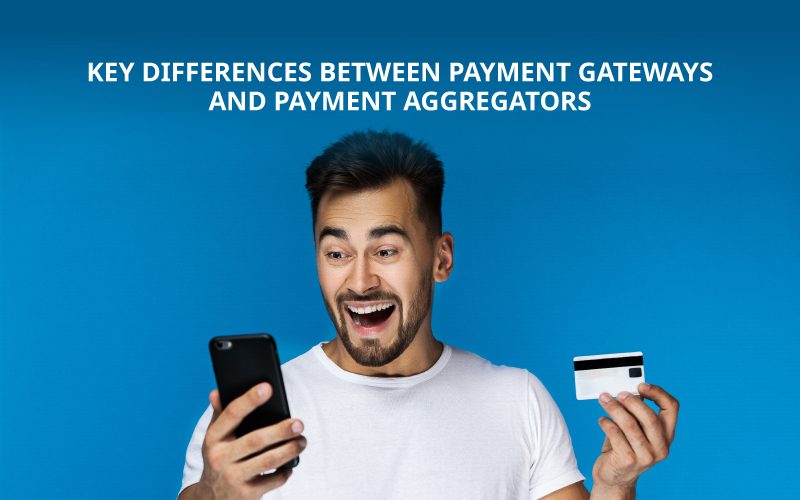There are some key differences between Payment Gateways and Payment Aggregators.
Let’s start with the core difference:
A payment gateway is a software that allows online transactions to take place, while a payment aggregator is the inclusion of all these payment gateways.
Let us go through some other differences and similarities.
Contents
- 1 What is a Payment Gateway?
- 2 What is a Payment Aggregator?
- 3 Examples of Payment Gateway and Payment Aggregator
- 4 Difference between Payment Gateways & Payment Aggregators
- 5 How payment gateways and payment aggregators help small businesses
- 6 How payment gateways and payment aggregators work together
What is a Payment Gateway?
A Payment Gateway is an eCommerce software application that allows online transactions to take place.
It is a pass-through mechanism through which cards, net banking and e-wallet payments are done. Payment gateways offer a means to accept online payments.
What is a Payment Aggregator?
Payment Aggregator is the inclusion of all these payment gateways.
Payment aggregators are service providers through which eCommerce merchants process payments. They allow merchants to accept bank transfers without setting up a merchant account that is associated with a bank.
With payment gateway aggregators, one merchant account is used to represent a number of merchants as opposed to the traditional model which disburses a merchant account to each merchant.
Examples of Payment Gateway and Payment Aggregator
A payment aggregator can offer a payment gateway, but a payment gateway cannot offer a payment aggregator.
A few examples of payment gateway aggregators are Citrus, Billdesk, Instamojo, CCAvenue and PayUMoney. These companies offer online payment gateway services to different merchants for a specific rate.
These payment gateway service providers take money from customers on behalf of the merchant and transfer the money to the merchant account after a stipulated time period, normally 3 days, depending on the payment aggregators’ policies.
Payment gateways in India have historically included banks. These include both public and private banks such as HDFC, AXIS, ICICI and more.
Difference between Payment Gateways & Payment Aggregators
Both payment gateways and payment aggregators are dependent upon each other. A payment aggregator need not act as a payment gateway, but a payment gateway will need an aggregator.
Payment options
Payment Gateways in India allow merchants to engage with a specific payment option put on the portal, whereas Payment aggregators offer multiple options for payment, from bank transfers, credit/debit cards, e-wallet transactions, and UPI.
For small businesses
Payment gateways use payment aggregators to be able to cater to small businesses. This is due to the fact that small businesses generally find the transaction fees provided by payment gateways too high and complex.
Mode of contact
Payment Gateways play the role of an intermediary with merchants and customers who want to pay for any goods or services they are purchasing from the site.
A payment aggregator is more of an interface through which said intermediaries accept payments and make settlements.
License
Payment gateways require RBI authorization before they set up a business.
But a payment aggregator requires a payment aggregator license and needs to obtain the necessary certification from the Payment Card Industry (Data Security Standard/ PCI DSS).
Related read: How to choose the right payment gateway in India
How payment gateways and payment aggregators help small businesses
Payment gateways can quickly access small businesses once they integrate with payment aggregators.
Payment aggregators are cost-effective for micro-transactions
The payment aggregator model tends to provide a platform for online transaction processing, with minimal or no startup fees and fixed costs.
How payment gateways and payment aggregators work together
It is a common misunderstanding that payment gateways alone are enough to process payments. This would work for a brick-and-mortar store (a POS machine for example) but not online.
An online payment gateway is just the technological side of the transaction. It mostly takes care of the data in the payment messages.
Payment gateways have a bank working behind the scenes to issue merchant accounts. When there are too many merchants applying for merchant accounts, and willing to process payments, the authorizing banks will have to organize both the underwriting and fund transfer process for multiple merchants, which could become too much.
This is where payment aggregators came in. Payment aggregators go through the underwriting process with the acquiring bank and process payments for many smaller sub-merchants.
“A payment aggregator might offer a payment gateway, but a payment gateway cannot offer a payment aggregator.” In a nutshell, they’re different. – Jordan Hale, Fr. Head of Marketing, Helcim
In the debate of Payment aggregator vs. payment gateway, you cannot choose one or the other. While you must have (the gateway), the other is a payment processing choice.
Confused about which payment gateway aggregator to pick? Instamojo has been in the game long enough to process your payments seamlessly, help you set up payment links, and online stores and track all your transactions in one place.
Instamojo also has the necessary licences required to become a payment aggregator and is also PCI DSS compliant.
Your business is in safe hands.


1 comment
Paytm,phonepe are payment aggregators or just payment service providers.?